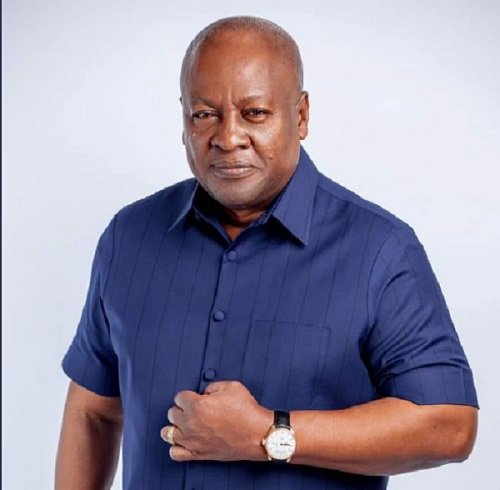Flagbearer of the National Democratic Congress (NDC), John Dramani Mahama has underscored the need for the adaptation of technology as a tool for sustainable development.
He said technology was transforming societies and economies, therefore, Ghana must harness the potential to drive sustainable development.
Speaking at the closing of the 75th Annual New Year School and Conference yesterday, the former president said “technology can improve efficiency, productivity, and access to essential services from agriculture to healthcare and education to infrastructure.
This year’s conference was on the theme ‘Nurturing Resilience: Adopting Technology and Embracing Humanism for Sustainable Development.’
It was organised by the University of Ghana School of Continuing Education with the Institute of Democratic Governance (IDEG) as one of the partners.
According to Mr Mahama, the erstwhile NDC government believed in the importance of technology that was why it invested an amount of $37million US dollars into distance education ICT facilities for all the then 10 regions of the country.
“The NDC has the know-how track record and credibility to pull this off. The NDC has the strongest track record for investing in and developing ICT infrastructure in Ghana. Our track record spans from digital infrastructure to digital applications for everyday life.”
He said innovation must be promoted while ensuring all citizens can access technology to bridge the digital divide and create a more inclusive and equitable society.
In his remarks, the Executive Director of ANYSC, Dr Andrews Jack Dotsey, emphasised the conference’s role in fostering national dialogue on developmental, social, and political themes, promoting social cohesion and growth.
He highlighted the consistent efforts of ANYSC in building national consensus among key stakeholders, including academia, civil society organisations, traditional societies, industry, and public institutions, addressing critical developmental and social issues that significantly impact the country.
Dr Jack Dotsey announced that the Vice Chancellor had allocated five acres of land for the development of the Digital Youth Village (DYV), positioning it as a dynamic bridge between academia, policymakers, and industry.
“The DYV’s focus includes accelerating digital entrepreneurship, advancing the national agenda and standards, fostering digital skills development, and encouraging youth participation, aiming for a centenary status.”
“The purpose is to create an enabling environment for the rapid growth of digital entrepreneurship in Ghana, while also serving as a learning center and innovation hub with top-notch infrastructure and technologies,” he added.
Dr Jack Dotsey further explained that part of his outfit’s strategic direction involved rebranding and marketing ANYSC to enhance participation and organising regional schools through collaborations.
After the deliberations, participants of the conference came up with recommendations which include a call for a review of the various social protection programmes to improve access, efficiency, and sustainability.
It was also suggested that the Ghana card should be leveraged as a foundational means of status identification for the targeted implementation of these programmes by linking it to health records with unique codes for easy healthcare accessibility and implementing a robust electronic payment system to deal with corruption and other challenges associated with the disbursement of funds to Livelihood for Empowerment and Against Poverty (LEAP) beneficiaries.
BY RAISSA SAMBOU

